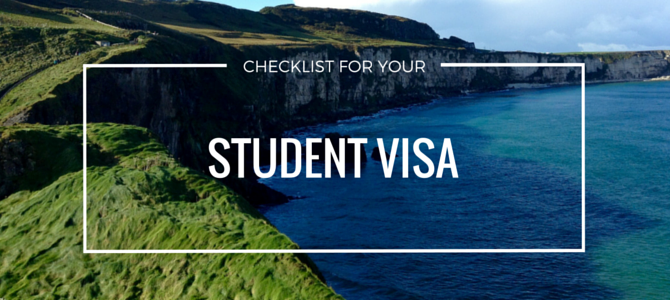Want to know more about applying for a student immigration card once you’ve arrived in Ireland? All students from outside the EU must register in person at the Garda National Immigration Bureau (GNIB) and in this blog William Dobie, our Canadian and TU Dublin Blanchardstown Campus (formerly IT Blanchardstown) Ambassador, tells you what to expect and what you need to bring…
After three full months of studying in Ireland, I couldn’t be happier. The staff, students and people in the Irish community are all fantastic. But before all the fun and studying begins you have to get here and confirm you can stay here. This means getting through all the legal paper work. Don’t worry, coming from Canada, not much has to be done before you get here around visas, it all is completed during your first few weeks of study.
All students from outside the European Union must register in person with the Garda (Irish police service). This is done at the Garda National Immigration Bureau (GNIB). This is where you will get your student immigration card for one year of study. You must renew it every year while studying in Ireland. Get this done as soon as possible, to get it out of the way.
The GNIB only issues a set amount of tickets every day. The office hours are typically 8am to 9pm, however tickets are often gone around 8.30am. So yes, wake up at 4am and catch the first city bus downtown to wait in line. Yes, there is a line at 6am! At the very least, a two city block lines. Once you get your ticket you will be instructed on an approximate time that your number will be called. You may leave the bureau then return at a later time (return about 30 mins before the time suggested). You will then start the vetting process. It is a long day, however it is worth it. The experience of studying in Ireland is a once and a life time opportunity. All great things in life can be challenging, but the time and effort you put into it will be more then worth it in the end.
Please note:
*Due to the amount of students applying, certain Garda offices don’t allow students to go on their own and line up for tickets in the morning. Instead, some universities liaise with the Garda office and students get the tickets through their college instead prior to the visit. Ask your international office for more information.
Here is a list of what you need to bring:
A valid passport
- Your passport will be stamped on arrival and indicate the last day you can apply for an immigration card.
- You have three months to register.
- Your nearest bureau location may be given at the border.
School student card
- Issued during your first week. You also need this to open a student bank account.
Financial support
- 3000 Euros* in an Irish bank account is needed.
- This is proof that you can support yourself over your schooling.
Proof of Irish residence
- This can be a letter from your college or a utility bill.
- Once you open a bank account, a statement can be used as proof of address.
Letter from your school addressed to the GNIB
- A formal letter stating that you are registered at your Irish school.
- This letter also states requirements for getting a student immigration card (essentially, this list).
Fee 300 euro*
- This can be paid via Visa or debit card when registering. They do not accept cash.
Medical insurance
- This is completed by your schools international office.
- Usually given to you by the end of the first week (depending on your school).
Please note:
*If students are in their 1st year in Ireland, if their home insurance covers them in Ireland, they can bring its proof to the Gardai and they’ll accept it. Whereas if a student is in their 2nd year or longer, they need to get Irish medical insurance, the cheapest one we found is with www.odon.ie
Entertainment & what to wear
- Some music or videos for the day.
- Dress appropriately! Yes, it does rain in Ireland, so bring a rain jacket!
Photocopy of Passport, Student Card
- Photocopy all your personal information, leave a copy at home and bring a copy with you along with the original documents
- Remember: Being over prepared is better than being underprepared. Bring ample documents.

